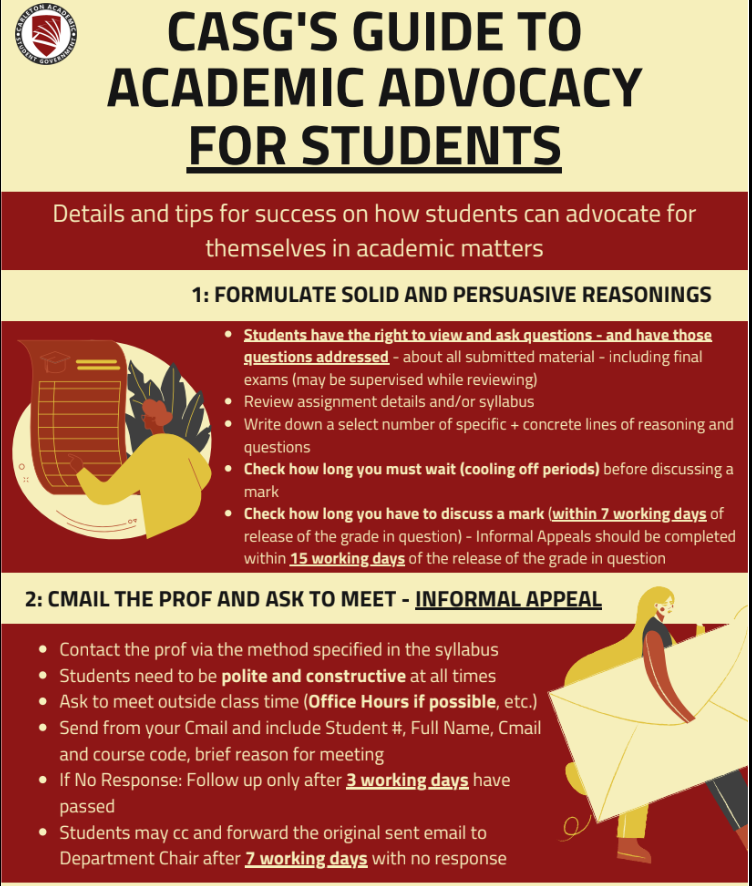CASG’s Guide To Academic Advocacy
For Students and Academic Societies
Undergraduate students at Carleton have rights with regards to viewing, asking questions about, receiving answers and informally and/or formally appealing on any graded work that they submit and any final grades that they receive.
This brief Guide provides a very generalized overview on, as well as the best tips to follow when, students are seeking to respectfully engage in or initiate academic advocacy processes - as well as how academic societies can support academic advocacy efforts.
Honourable Mentions
Academic Regulations of the University - Grading 5.2 The Course Outline
“The instructor is required to provide a formal statement to students called the Course Outline. The course outline must be made available to all Carleton students registered in that course, on or before the required date found in the schedule for The Academic Year, normally one week prior to the start of a term. The course outline must specify: 1) Complete calendar description. 2) Proposed list of topics to be covered. 3) Mandatory Required Materials to be acquired. 4) All the elements that will contribute to the cumulative grade earned and the overall approximate grade breakdown for the course. The elements and grade breakdown may initially be approximate, but are normally confirmed no later than the last day of registration for the term. If faculty deviate from section 5.4 on the grading system, the grading system that will be used must be clearly indicated. If additional requirements beyond the cumulative grade earned must be satisfied in order to pass the course, this should be clearly identified in the course outline. 5) Due dates for major course elements should be indicated. The dates may be tentative initially, but are normally confirmed no later than the last day of registration for the term. If changes to due dates are required students should be given at least two weeks notice. Final scheduled exam dates are excluded from the information provided, and will be presented at a later date in the term. 6) TA information, as available. 7) Any required time commitments occurring outside of the formally scheduled lectures, tutorials, labs and discussion groups. Changes may be required but students should be given at least two weeks notice. These time commitments are specific to course requirements and do not imply study time or group work, for example. 8) The outline must also include/reference all University policies governing academic accommodation.”
Academic Regulations of the University - Grading 5.3 Early Feedback Guideline
“While the nature and frequency of such feedback will vary with the course and level, Carleton University is committed to providing students with appropriate and timely feedback on their work. Accordingly, wherever possible, and especially in first- and second-year courses, instructors are urged to include academic work that is assigned, evaluated and returned prior to the 25th teaching day of each term. More generally, all instructors are urged to include academic work that is assigned, evaluated and returned prior to the 40th teaching day of each term. The spirit of this guideline should be followed during the summer term. In particular, all instructors are urged to include academic work that is assigned, evaluated, and returned at least two days prior to the last day to withdraw from the course in the Early, Late, or Full Summer term. Course outlines should provide an indication of approximately when the first graded piece of work will be returned to students. In cases where a course does not lend itself to early feedback, this should be clearly noted on the course outline.”
Preparing to Teach Your First Class at Carleton - Teaching Guidelines and Recommendations
Teaching Regulations and Procedures for FASS and FPA - Course Outlines

